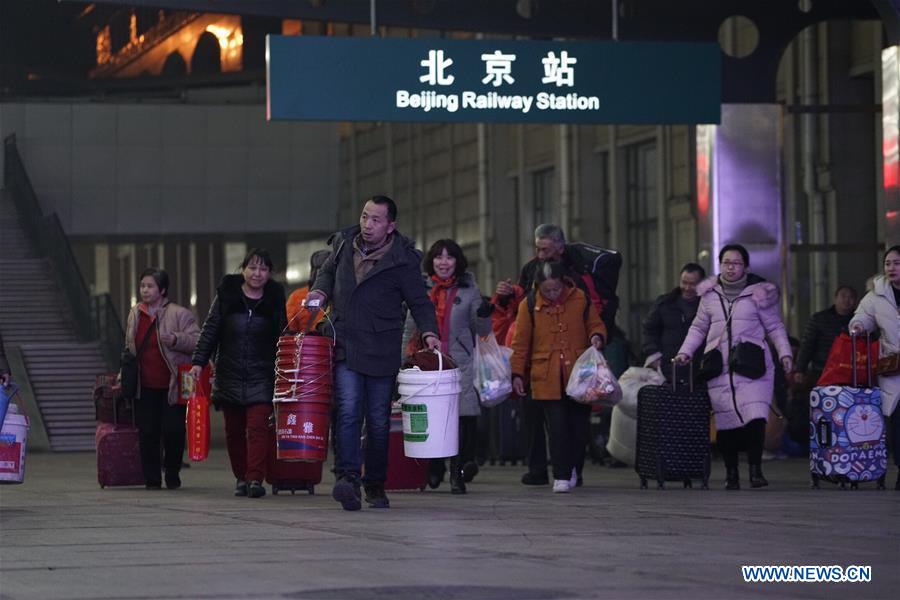
Passengers prepare to take the train at Beijing Railway Station in Beijing, capital of China, Feb. 1, 2018. The 2018 Spring Festival travel rush, known as the Chunyun, started on Thursday and will last till March 12. About 2.98 billion trips are expected to be made during the Chunyun. The Spring Festival, or Chinese Lunar New Year, falls on Feb. 16 this year. (Xinhua/Xing Guangli)
BEIJING, Feb. 1 (Xinhua) -- China's Spring Festival travel rush, known as the Chunyun, began Thursday.
Qian Leiming boarded the K4668 train from northwest China's Xinjiang Uygur Autonomous Region to Shanghai, a 4,129-km journey that will take almost three days.
"I do dried fruit business in Hotan Prefecture, and I go home every year to celebrate Lunar New year," Qian said. "Tickets to Shanghai are extremely difficult to get, but this year I got my ticket in advance online."
Spring Festival, or Chinese Lunar New Year, falls on Feb. 16 this year. Hundreds of millions of Chinese will return to their hometown for family gatherings or travel around the country, putting huge pressure on the transport system.
About 2.98 billion trips are expected to be made during the 2018 Spring Festival travel rush between Feb. 1 and March 12, basically the same figure as last year, according to China's top economic planner.
To enhance railway transport capability, an additional 1,152 and 1,330 train services will be scheduled before and after the festival, respectively, on the basis of 3,819 operating trains every day, according to Li Wenxin with China Railway Corporation.
An additional 177 high-speed train services will be scheduled to operate each night, which will be able to carry 100,000 more passengers each day, he said.
Aviation authorities plan to schedule an additional 30,000 flights during the travel rush on the basis of about 14,500 flights every day, said Wang Zhiqing, deputy head of the Civil Aviation Administration.
HIGH-SPEED TRAINS, MOTORCYCLES
In southwest China's Guizhou Province, many passengers are going home the high-speed way.
Wen Hua, 53, is a migrant worker from Guizhou's Tongzi County. Wen works at a construction site in the eastern seaboard of Fujian Province, more than 1,600 km away from home. Each year, going home would take almost 27 hours. But now, high-speed trains make his journey much easier.
"Now I can transfer via the high-speed trains in Guiyang, which greatly slashes my time to reach home," he said.
In the southern Guangxi Zhuang Autonomous Region, many migrant workers choose to go home by motorcycle.
Zhang Youjin, 38, is from Guangxi's Hezhou City. Zhang and his wife work in Guangdong Province with their child. On Thursday morning, they packed a bottle of hot water, four bottles of congee and other life necessities in two colorful bulging plastic bags, and hopped on a motorcycle to head home.
"It's freezing outside, but the journey is much cheaper," Zhang said.
It's the fifth year that Zhang rode his motorcycle home. The journey is about 400 km, and the family can reach home within a day.
According to official figures, each year more than 100,000 people ride motorcycles from Guangdong to Guangxi. To cater to the motley motorcyclists, local authorities have set up areas to provide free food to the army of people.
BUSY CALLS
The Chunyun rush generates huge pressure on the transport system.
Huang Fang is a telephone operator for the 12306 train ticket booking hotline in Shanghai.
"I have taken 154 calls so far today," Huang said. "I usually take about 250 calls a day, but during Chunyun the number can exceed 300."
"Requests from incoming calls vary a lot, from ticket booking to telling elderly people how to book tickets online, even to a husband looking for his wife," Huang said.
"My lips get dry every day I go home, so I always carry lip balm and medicine for soothing the throat," she said.
During Chunyun, all 162 telephone operators of the 12306 call center are on duty, said Dong Weixin, director of the center in Shanghai.
"It's a busy job," Huang said. "But I am glad to help people get home." Enditem














